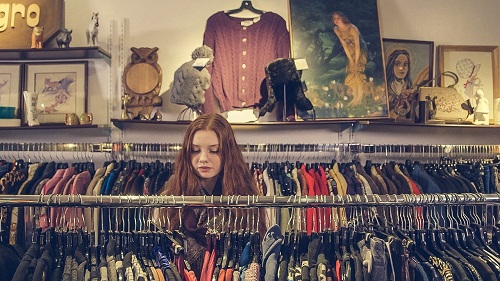FW
Some of the most well known Italian innovative brands are creating new digital showrooms that allow them to connect with their customers, and capitalize on never-before-seen circumstances. Liu Jo, an Italian clothing company founded in 1995, has launched its ‘digital first’ sales campaign for the 2021 line. The digital showroom will see the brand present its Liu Jo Dream On virtual show, broadcast on a dedicated website and following the format of a news program, with accompanying musical refrains and voiceover commentaries.
The platform will also host digital displays and stories where it will be possible to discover collections with the support of Liu Jo’s sales team in tailor-made consultancy sessions. Italian clothing maker, Diesel has launched Hyperloom, a digital tool which allows shoppers to explore its virtual showroom that is modeled on its flagship store in Milan. Shoppers can interact with clothing items online; products are rendered in 360-degree displays and are presented following the particular style and identity of the Diesel brand. The realistic visuals of products are accompanied by product descriptions as well.
The option for consumers to view a product close-up and in a dedicated virtual space with video-led fittings of each style collectively aims to replicate the touch and feel experience that consumers would get when shopping in real life. To help shoppers in the later stages of the customer journey, a live Diesel vendor will be connected with potential buyers and assist shoppers in the purchase process. By enlisting digital initiatives such as the digital showroom, the company aims to drastically reduce its carbon footprint.
Luciano Donatelli. Fashion Consultant and Former Group Manager, Ermenegildo Zegna Group, has quickly put together a group of investors under the Club Deal 8 moniker, including online retailer Giglio Group, the Biella-based Gruppo Verzoletto for buying Brooks Brothers.
Over the years, Donatelli has initiated prestigious licenses with brands such as Gucci and Valentino. He was the president of industry associations Confindustria Biella and vice president of Confindustria Piemonte. His experience in the Biella textile region can serve him well as Brooks Brothers has for years sourced fabrics from that area, as well as from Italy’s Veneto, Tuscany and Apulia regions. His goal in taking control of Brooks Brothers is to reach sales of $3 billion in five years and grow production by six-fold. Donatelli sees sales of about $1.2 billion to be derived from the Americas; $1.2 billion from the Far East and $600,000 from Europe and Russia.
He aims to keep the brand’s American spirit, but also produce more ‘glocal’ collections, adapting the label to different regional areas, highlighting a couture division in the US to be produced in the Boston and North Carolina plants.
The Indian textile ministry has opposed Directorate General of Trade Remedies (DGTR)’s recommendations for imposing of anti-dumping duty on import of nylon multifilament yarn from China, Korea, Taiwan and Thailand.
Weavers in the country have stated the quality of nylon yarn manufactured by the domestic yarn spinners is not up to the mark and the weavers are forced to import better quality yarn from other countries to reduce production loss and to supply quality fabrics in the domestic and international markets.
According to news reports, the Gujarat textile commissioner’s office had written to the textile ministry in February that against the increase of 19 per cent in the import of nylon multi-filament yarn between 2015 to 2019, the production of yarn in the country had increased by almost 24 per cent during the same period.
The Council of Fashion Designers of America released the list of nominees for the 2020 CFDA Fashion Awards. Winners of the in-person event, originally scheduled for June 8, will be revealed on CDFA.com and CFDA’s social channels the morning of September 14, kicking off the official New York Fashion Week schedule.
This year only, CFDA has decided to focus on designer nominee categories and forgo honoree awards.
The nominees for America Womenswear Designer of the Year are Ashley and Mary-Kate Olsen for The Row; Brandon Maxwell; Gabriela Hearst; Marc Jacobs, and Tom Ford.
Competing for American Menswear Designer of the Year are Emily Adams Bode for Bode; Kerby Jean-Raymond for Pyer Moss; Thom Browne; Todd Snyder, and Tom Ford.
The American Accessories Designer of the Year contenders are Ashley and Mary-Kate Olsen for The Row; Gabriela Hearst; Jennifer Fisher for Jennifer Fisher Jewelry; Stuart Vevers for Coach, and Telfar Clemens for Telfar.
In the American Emerging Designer of the Year categories, the nominees are Christoper John Rogers; Kenneth Nicolson; Peter Do; Reese Cooper, and Sarah Staudinger and George Augusto for Staud.
The 2020 CFDA Fashion awards feature two new nomination categories: Global Women’s Designer of the Year and Global Men’s Designer of the Year. Nominees for the Global Women’s Designer of the Year are Daniel Lee for Bottega Veneta; Dries Van Noten; Miuccia Prada for Prada; Pierpaolo Piccioli for Valentino, and Rick Owens.
Vying for Global Men’s Designer of the Year are Craig Green; Dries Van Noten; Jonathan Anderson for Loewe; Kim Jones for Dior, and Virgil Abloh for Louis Vuitton.
Cabana, the main beachwear segment trade show in the United States, launched its special edition Cabana Virtual Marketplace in partnership with Joor an American digital platform on July 20, 2020. The three-day event is being represented by brands such as Água de Coco, Catarina Mina, Haight, Lenny Niemeyer, SERPUI, Triya and Yukio with the support from Fashion Label Brasi, and Adriana Degreas with support from Texbrasil, both internationalization programs created from a partnership between Apex-Brasil (Brazilian Export and Investment Promotion Agency) and Abest (Brazilian Association of Fashion Designers) and Abit (Brazilian Association of the Textile and Clothing Industry), respectively. These brands will be featured on the JOOR platform for four weeks after the event is over.
Cabana’s partnership with Joor will help Texbrasil to promote the visibility of companies, even without the physical event: Fashion Label Brasil will be responsible for the attendance of Brazilian brands to the trade show since 2014.
 A report by GlobalData revealed post COVID-19, sustainability has become one of the most important theme for fashion businesses across the world. Public anger over the lack of action on climate change and corruption has accelerated sustainability discussions amongst fashion retailers.
A report by GlobalData revealed post COVID-19, sustainability has become one of the most important theme for fashion businesses across the world. Public anger over the lack of action on climate change and corruption has accelerated sustainability discussions amongst fashion retailers.
Retailers need to adapt to a different business model that incorporates circular fashion and sustainability, says the report. Retail Insight Network advises these retailers to promote circular economy which would not only protect the environment but also help them stay relevant in a changing retail landscape.
Replacing fast fashion with circular alternatives
UK-based charity Ellen McArthur Foundation defines circular economy as a way to redefine growth by separating economic growth from the consumption of finite resources and designing waste out of the system. It also includes regenerating the natural system by switching to renewable energy sources. One of the ways, the fashion industry can become sustainable is by replacing fast and linear fashion with circular alternatives.
of finite resources and designing waste out of the system. It also includes regenerating the natural system by switching to renewable energy sources. One of the ways, the fashion industry can become sustainable is by replacing fast and linear fashion with circular alternatives.
One of the most-used retail models, fast fashion promotes a ‘wear once’ attitude, with its constant introduction of new stocks. Through this, it reduces the lifecycle of clothes, which are made, bought and disposed off after little use. As Waste & Resources Action Program (WRAP) reveals, UK consumers dispose an estimated £140m and 350,000 tons of used clothing annually.
Promoting sustainable transportation and delivery
But the fast fashion model does not damage environment just by wasting clothes but also through the pollutants that are released during their delivery and transportation. A circular business model can help retailers reduce this damage and grow businesses. Many fast fashion brands including Nike have embraced the circular fashion model. Nike has created its new trainer ‘Space Hippie’ with around 50 per cent recycled waste while Inditex has pledged to convert stores into ‘sustainability hubs’ within the next two years.
GlobalData’s June study conducted in partnership with ThredUp expects second-hand apparel market to grow to $64billion within the next five years. The study states, online thrifting is likely to grow to 69 per cent between 2019 and 2021, while the broader retail sector is likely to shrink 15 per cent. The analysis also expects resale to be a bigger industry than fast fashion by 2029, with traditional thrift and donation-based fashion to be worth $36billion, resale to be worth $44billion, and fast fashion $43 billion. The total value of second-hand fashion will be at $80 billion, almost double that of fast fashion.
Rise of fashion re-commerce
The rise of circular fashion may have been a result of changing perceptions of retail and the need for sustainability however, COVID-19 has accelerated its popularity amongst consumers. Stastistics by GlobalData and ThredUp reveals 79 per cent consumers plan to cut their apparel budget in the next year, with 88 per cent consumers preferring to adopt a new thrifty hobby such as mending clothes and sewing face masks.
Fashion retailers can benefit from this by switching to new business models, such as resale and re-commerce. Resale can prove as a green alternative for retailers as re-commerce sites like eBay, and Depop have been increasing in their focus on second-hand buying. Department stores are also integrating resale into the retail industry. American department store Macy’s has employed brick-and-mortar ThredUp thrift stores, with more department stores like JCPenney expected to follow soon. Another retailer & Other Stories sells pre-owned garments through the ‘pre-loved’ section of its website while Barclays, a British financial services company views COVID-19 as an opportunity for brands to embrace sustainability and switch to circular fashion.
 Even though it’s perceived as a positive step, US apparel manufacturers are skeptical about increasing calls for nearingshoring supply chains. They believe, textile and apparel production in the US is unlikely to return to its former glory as it does not have the required scale and quality of raw materials. One prominent example of this is the lack of hemp raw material in the country. Philadelphia-based designer Mary Alice Duff, who began sourcing hemp domestically, found the fiber fabric available in the US is not scaled, nor skilled enough. Additionally, the 2019 tariff hike has also increased hemp prices in the country by around 25 per cent. Hence, Duff is compelled to source hemp-cotton blend from China.
Even though it’s perceived as a positive step, US apparel manufacturers are skeptical about increasing calls for nearingshoring supply chains. They believe, textile and apparel production in the US is unlikely to return to its former glory as it does not have the required scale and quality of raw materials. One prominent example of this is the lack of hemp raw material in the country. Philadelphia-based designer Mary Alice Duff, who began sourcing hemp domestically, found the fiber fabric available in the US is not scaled, nor skilled enough. Additionally, the 2019 tariff hike has also increased hemp prices in the country by around 25 per cent. Hence, Duff is compelled to source hemp-cotton blend from China.
Upgrading its manufacturing skills
Another factor that holds back nearshoring of apparel manufacturing is the lack of latest technology. Fatima Anwar, CEO, Ethical and Sustainable Apparel Sourcing, says the convenience of co-locating the entire garment manufacturing process should not be overlooked. According to her, the US is unlikely to see resurgence in apparel production unless the cut-and-sew capabilities of manufacturers are upgraded.
Sourcing, says the convenience of co-locating the entire garment manufacturing process should not be overlooked. According to her, the US is unlikely to see resurgence in apparel production unless the cut-and-sew capabilities of manufacturers are upgraded.
Though automation could fix these problems it hasn’t yet done so as the cut-and-sew process is incredibly labor-intensive. Bangladesh manufacturers don't have the technology as yet to make fully-automated facilities. Hence, Anwar is forced to keep one foot in New York and one in Bangladesh. Though her clients are based in the US, the manufacturers she connects with are in Bangladesh. US sourcing of textiles does not make business sense for most of her large-scale clients.
And Anwar says buyers are mainly attracted drawn to three factors: convenience, price and experience. Experience translates to high quality and high productivity rates. According US production resources might make sense for small quantities at a luxury price point. The country does not have a lot of people specialized in textile and textile formulation.
Filling supply chain gaps with dead stock
However, the US has plenty of dead stock that can help brands fill the gap in their supply chains, says Stephanie Benedetto, Founder, Queen of Raw, an online marketplace for dead stock. Benedetto estimates the US produces more dead stock than it does virgin fabric. In addition to luxury materials like leather and silk, Queen of Raw offers popular synthetic textiles produced in Asia. Its user base has grown exponentially since the beginning of the pandemic as most US-based brands cancelled orders from suppliers to hold onto cash and, are to yet decide on their future collections. These brands are utilizing the current available time to plan a less wasteful system based on nearshoring. However, it’s quite early to know if they can truly create more localized on-demand, sustainable, efficient supply chains.
At the General Assembly held by the European Committee of Textile Machinery Manufacturers (Cematex) appointed as its Ernesto Maurer as its new President. Maurer took over the task from another experienced name of the textile machinery sector, Fritz P. Mayer.
Maurer has been the President of the Swiss Textile Machinery Association (swissmem) since 2015, and was also a Member of the Cematex Board of Directors. Maurer has been active in management as Cematex 1st Vice President for the past four years. Sitting in the chair of the president at a time of difficulties due to the pandemic, Maurer will hold three ITMA fairs planned in Europe and Asia within the four-year term of office.
Also elected at the General Assembly were 1st Vice-President Mikael Äremann (TMAS, Sweden) and 2nd Vice-President Charles Bauduin (Symatex, Belgium). Cematex has an important position as the owner of ITMA fairs, which is considered as the biggest event in the global textile machinery and technologies sector. The fairs, the first of which was held in 1951, are regularly held in Europe and Asia. During the tenure of Ernesto Maurer, 2 Asian and 1 European editions will be held. Due to the Covid-19 pandemic, ITMA Asia + CITME fair will be held in Shanghai on 12-16 June 2021 instead of October 2020. Following this, ITMA Asia + CITME 2022 fair will meet the sector in the same city.
British retailer Marks and Spencer Group Plc plans to announce hundreds of job cuts in the coming week, report Sky News.
The cuts would be part of redundancy plans that the company plans to announce in the coming days as apart of a restructuring that could affect several thousand employees in coming months.
In May, when the pandemic hit, M&S was already in the middle of a new plan to improve its fortunes, including reviewing headcount, cost cuts and store closures. The company furloughed around 7,000 employees and announced plans to close about 100-120 stores.
London-headquartered M&S will be the latest retailer to join firms like health and beauty chain Boots and department store John Lewis in warning that thousands of jobs would be at risk.
British retail faces more than 5,000 job cuts as retailers warned customers were unlikely to return to their old shopping habits after the coronavirus crisis, in the latest blow to the country's ailing economy.
COVID-19, a respiratory disease caused by coronavirus, has put an intolerable strain on retailers, already battling high rents, business rate taxes, tight margins and a rapid shift online.
European Textile Services Association (ETSA), which released its 13th update to members since lockdown had started in March, hopes to see some form of summer recovery. The association continues to lobby with the government for hospitality status for hospitality sector laundries though it is yet to get any formal response as yet. Its survey done in June highlighted revenues in the region’s industrial services workwear as well as in the health sector have declined sharpely while revenues in the hospitality sector plummeted by 80 per cent in April.
According to the association, the region would require over 18 months to recover from this. It is resorting to furlough of personnel to avoid layoffs as much as possible throughout the sector. The association is also cutting back on its investments even as cancelled orders on new equipment, products and services are having a cascading negative effect on suppliers
The Cabinet Office and NHSI of the ETSA have been leading the work on manufacturing and procuring reusable gowns for healthcare use. However, after several weeks in to the process, they have come to the conclusion that the individual health trusts and care homes should procure gowns locally depending on the exact requirements. However, the Government departments are keen to ensure that they recommend right specifications as firmly as they can.
Meanwhile, NHS England has also confirmed they will be ordering centrally for NHS acute care hospitals. They are proposing to fix RFID tags on these gowns to enable the creation of a national open protocol pool stock. They have also confirmed that the gowns are going to be a permanent addition to the product range and will be included within future framework agreements.












